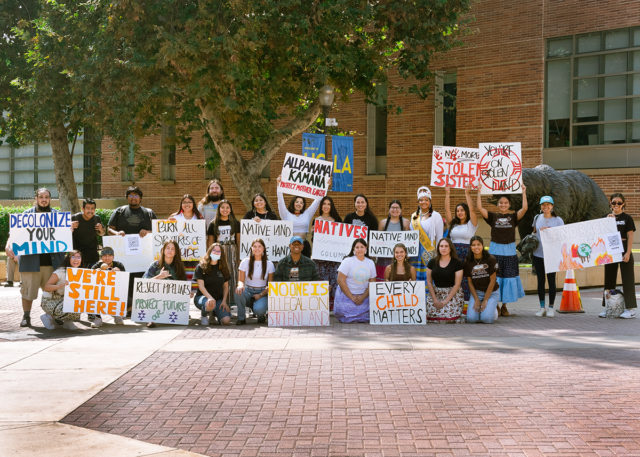The American Indian Student Association decorated the Bruin Bear and hosted a jewelry sale Monday in honor of Indigenous Peoples Day.
The student organization placed a Pendleton blanket and signs on top of and around the Bruin Bear recognizing that UCLA sits on Indigenous land. A group of tables set up in Bruin Plaza displayed jewelry for sale made by AISA members with traditional materials, including shells, beads and turquoise.
Katrina Herrera, a fourth-year biology student and a co-chair of AISA, said the organization has helped her find pride in her culture that she hopes to share with the greater community.
“I just find it very important to make sure that we’re all representing ourselves … and just answering questions to the greater UCLA community because a lot of students still don’t really believe or know that we’re still here standing strong and tall on campus,” said Herrera, who identifies as Navajo.
AISA members spent the event, which lasted from 10 a.m. to 2 p.m., wearing traditional clothing and talking to students, Herrera said. Students also held signs addressing issues including land recognition and a need for justice and investigation into cases of missing and murdered Indigenous women, said Desirae Barragan, a fourth-year American Indian studies and human biology and society student and a co-chair of AISA.
Proceeds from the jewelry sale will also serve to support future AISA events throughout the year, including its annual powwow in the spring, added Barragan, an enrolled member of the Gabrieleño Band of Mission Indians.
The Indigenous Peoples Day event, which was first held in 2021, saw more students participate this year, Herrera said. Barragan added that she hopes the next generations of Native American Bruins will continue the tradition. AISA itself has also seen an increase in general membership this year, she said.
“Our first meeting we had over 35 members, and for us, that’s pretty groundbreaking,” Barragan said. “We know there’s a lot of Native students on campus, but just to have everyone in one space once a week has been really exciting, so that we can do bigger and better for our events and exposure for visibility on campus.”
Members of the Pacific Islander Student Association also participated in the event, joining with AISA to help provide visibility of Indigenous peoples and educate the campus on issues affecting their communities, said Kaiwi Greaney, a third-year history student and PISA’s Pasifika Arts and Culture Night coordinator.
The UC should do more to recognize Indigenous Peoples Day and support its Indigenous students, added Greaney, who identifies as Native Hawaiian and is also AISA’s youth conference coordinator.
“The entire University of California system was not intended for us as Indigenous people – it’s kind of intended for the opposite,” Greaney said.
Beyond land acknowledgements and emails, the UC should make a greater effort to directly support its Native students, Greaney said.
He added that the Bruin Bear was being cleaned all morning, meaning AISA was unable to decorate in celebration of Indigenous Peoples Day for the majority of its event, although it had been able to decorate earlier the year before.
Other UC decisions continue to stand at odds with Indigenous peoples’ interests, he added, including its position as the largest monetary supporter for the planned construction of the Thirty Meter Telescope at Mauna Kea, a mountain sacred to Native Hawaiians. Such decisions make it important for indigenous peoples to come together in support of one another, Greaney said.
Justin Rodriguez, a fourth-year microbiology, immunology and molecular genetics student and vice chair of AISA, said the club was also able to connect with more Indigenous students and invite them to meetings through the event.
“We just want to make people aware that we’re still here. We’re not going to go away. We’re still on Indigenous land,” said Rodriguez, a member of the Rincon Band of Luiseño Indians. “We’re just paying our respects and just honoring our ancestors by remaining here and continuing to represent our communities.”


Comments are closed.